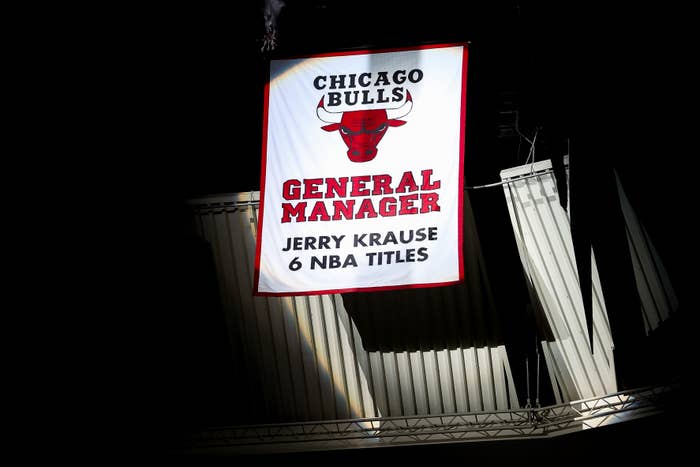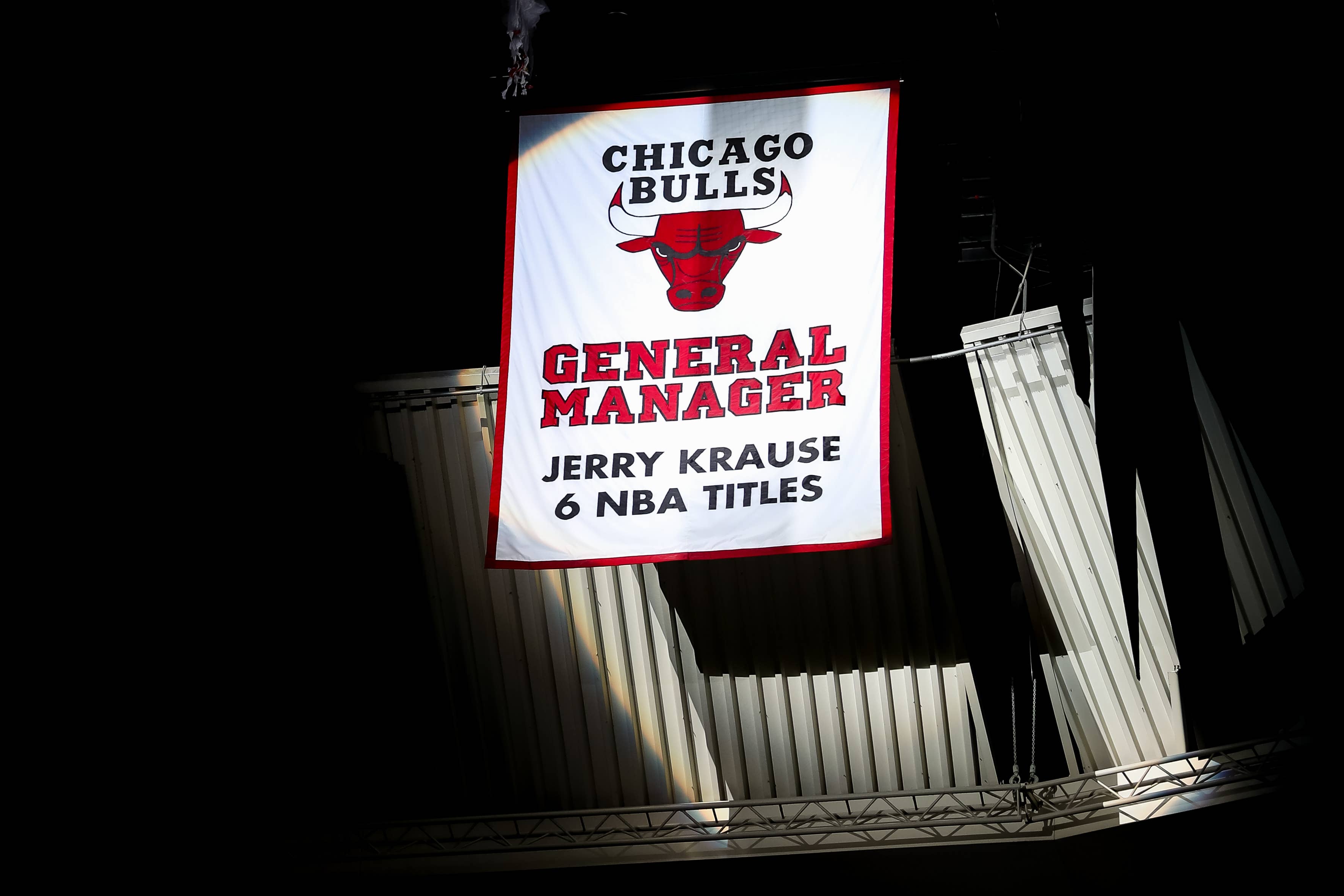
Jerry Krause didn’t draft Michael Jordan. His predecessor, Rod Thorn, did. But Krause, who died Tuesday at the age of 77, took over as Bulls GM in 1985 and acquired every other piece of the team that would go on to win six NBA championships. He also served as a convenient foil for players and coaches alike—his “organizations win championships” statement was met with derision, and when the Bulls dynasty was dynamited following the ‘98 title, he bore the brunt of the blame. Only now is he getting the credit he deserved all along. Unfortunately, his much-deserved and long-overdue Hall of Fame induction will come too late for him to enjoy it.
Krause was a sports lifer, a scout for both baseball and basketball whose claim to fame was “discovering” Earl Monroe for the Bullets. He also tried to convince the Bullets to draft a square-shouldered forward from North Dakota named Phil Jackson—they didn’t, but Krause still kept tabs on him. By the time he took over the Bulls in ‘85, the then-46-year-old Krause had a tremendous array of contacts as well as a firm grasp on how teams should be constructed. He also had a cornerstone superstar in Jordan, whose rookie season had established him as an elite scorer. All he needed was everything else.
In May of 1986, Krause hired Doug Collins as the Bulls’ coach. Collins, then 35, was a broadcaster and assistant at Arizona State who had never been a head coach on any level and was just five years removed from his NBA playing career. The following year, Krause convinced Collins to bring on Jackson, who had been coaching in the CBA and overseas, as an assistant. He also hired a 63-year-old basketball lifer named Tex Winter. In 1989, when Collins was fired, Krause gave Jackson the head job.
Even when the Bulls were in the midst of their greatest success, Krause was looking for the next move.
In the meantime, he was making personnel moves almost constantly. He drafted a bruising forward out of Virginia Union named Charles Oakley, flipped center Juwann Oldham for a pick, used it on center Olden Polynice, and traded him for spindly Central Arkansas forward Scottie Pippen and another first-rounder (which eventually became All-Star guard B.J. Armstrong). He also wasn’t afraid to go against the wishes of his superstar guard—or to put his coaches’ opinions ahead of his own. In 1988, pushed by Collins and Jackson, he traded Oakley—who’d already become a fearsome enforcer and rebounder—for Knicks center Bill Cartwright. Jordan didn’t like the deal, but the mild-mannered, sharp-elbowed Cartwright would be a key piece to the Bulls’ first three-peat run.
There is no doubt that Krause enjoyed the results of his work—during championship celebrations he was as champagne-drenched as anyone—but what he loved most was the work itself. Even when the Bulls were in the midst of their greatest success, Krause was looking for the next move. In the second round of the 1990 Draft, Krause selected a slender 6’11” 21-year-old from Croatia named Toni Kukoc, and spent the next couple of years wooing him. This did not sit well with the current Bulls, and when Jordan and Pippen played on 1992’s Dream Team, they made sure to go hard at Kukoc when the U.S. faced off against Croatia. Eventually, of course, Krause succeeded in signing Kukoc, who was the sixth man for three title teams.
It is no secret that the Bulls stars were criminally underpaid in the ‘90s, thanks to long contracts signed just when salaries were taking off and the unwillingness of management to renegotiate. On top of that, Krause’s constant need for change saw him shop Pippen multiple times—for Shawn Kemp in one instance and for the rights to high schooler Tracy McGrady in another—both which could have extended the Bulls’ window or at least facilitated rebuilding, but would have also broken up a championship core.
By then, Krause was already seen by some as the villain in a story that didn’t even require one. Stories from Sam Smith’s 1991 book, The Jordan Rules, revealed that Jordan had nicknamed him “Crumbs” due to his messy donut-eating habits, and that even Jackson—who Krause pulled from CBA obscurity—belittled his boss to placate his players. By 1998, as the Bulls dynasty imploded under its own weight, Krause, who said Jackson wouldn’t be returning the following season no matter what, was seen more as the reason for the end rather than the reason the dynasty had happened in the first place.
Then, presented with a blank slate, Krause stumbled. Top-tier free agents spurned Chicago, perhaps because of the blustery weather, perhaps because following Jordan was a job no one wanted. Top draft pick Elton Brand excelled, but Krause traded him to the Los Angeles Clippers for the rights to high school center Tyson Chandler, who he paired with fellow high schooler Eddy Curry in an alarmingly young frontcourt tandem. The Baby Bulls never really got a chance to grow up, and Krause’s handpicked coach, Tim Floyd, seemed similarly overmatched. Floyd resigned on Christmas Eve in 2001. Krause retired in 2003, ostensibly for health reasons, job left undone.
When Krause’s death was announced yesterday, both Jordan and Jackson issued statements praising their old boss. Since the very public end of the Bulls in 1998, Jordan and Jackson have done front-office work of their own—Jordan with the Wizards and Hornets, Jackson with the Knicks. Neither has come close to replicating Krause’s success. Perhaps now they understand how difficult his work really was. And how they couldn’t have won all of those titles without him after all.

